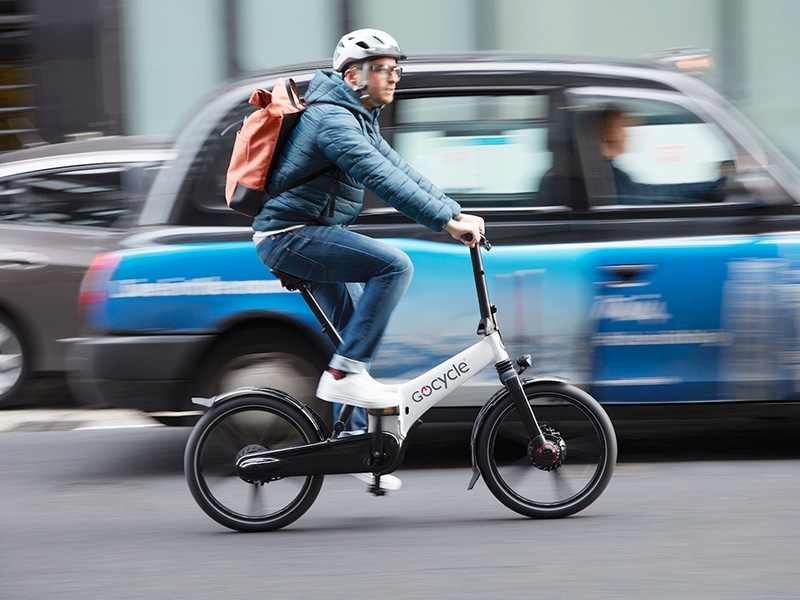
E-bikes have an important role in making our cities more sustainable
The UK government sparked debate last week with proposals for electric vehicles to have green number plates and be able to use bus lanes in order to help boost uptake. But are they missing the point? Electric vehicles are vital in making our urban areas more sustainable, but are they just a part of the puzzle. Gocycle designer and founder Richard Thorpe puts forward the case for e-bikes.
If we all switched to using electric vehicles in our urban areas tomorrow there is no doubt air quality would improve significantly. However, electric cars don’t tackle the congestion crisis that is gridlocking our cities or the trend towards more sedentary lifestyles associated with poor health. This is where active commuting comes in – and e-bikes. I truly believe that they are the vital missing piece in the puzzle to accelerate our shift to more healthy and sustainable urban transport.
The electric bike movement is gathering pace across Europe as an increasing number of people realise their benefits. More than one million e-bikes were sold in Germany during 2018 while the Netherlands, a land famed for its love affair with cycling, saw e-bike sales overtake that of regular bicycles in 2018. But why have they become so popular?
E-bikes are fun
I founded Gocycle in 2002 and have been using an e-bike daily for the last 20 years – be it commuting, running errands or just for fun, I still love riding them to this day. The combination of electric power with a lightweight two-wheel vehicle brings a sense of freedom and convenience unrivalled by any other urban mode of transport. The electrical assistance removes a lot of the barriers to entry for cycling that can put people off. You don’t have to be as fit as a Tour de France rider to use them and you certainly don’t need to wear lycra (unless you want to). Being able to adapt the level of electric assistance means riders can get as much or as a little of a work out as they would like. We have all had a negative experience that has put us off cycling – be it a steep hill, headwinds or poor weather. Having a motor on tap helps to level these factors and makes getting out of the door easier – which is half the battle in sticking with an active commuting lifestyle.
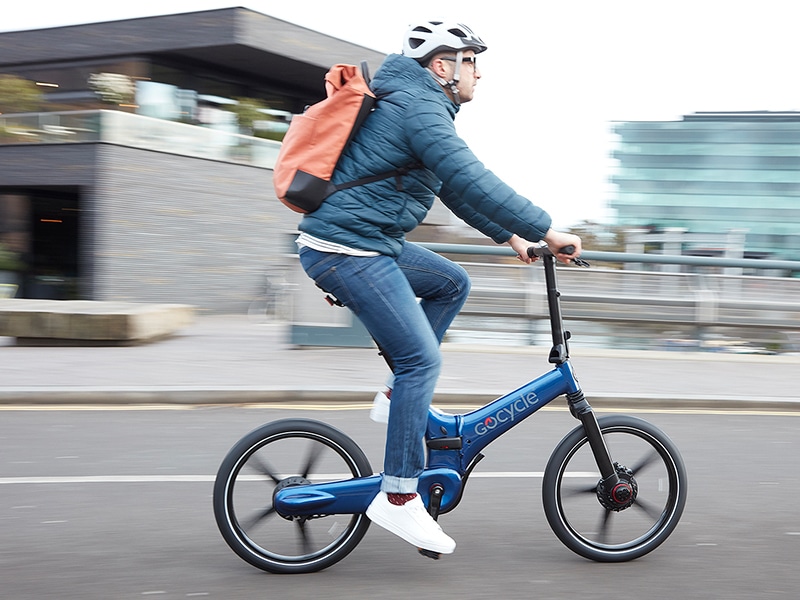
The fast-folding GX is the latest urban e-bike from Gocycle
They are good for you
E-bikes are often still dogged by the negative perception of being ‘cheating’ which used to bother me more than it does now because the tide is turning. For me, cheating is getting in your car when you could own and ride an e-bike instead. We all have different fitness levels and e-bikes enable more people to stay more active more often. The more e-bikes out there in my opinion, the more people will be cycling and that’s a good thing.
In fact, recent research highlights that the fitness benefits of using an e-bike is comparable to that of a traditional bike and there are some interesting trade-offs. One Norwegian study, highlighted in the Telegraph, found that riders on regular bikes used roughly 20% more energy than those on e-bikes, but the e-bikes got to their destination around 20% faster – a pretty fair trade off!
In the EU legislation dictates that electric pedal assistance is capped at 15.5mph, but riders can pedal as hard or as fast as they desire and that assistance speed is typically higher than the average speed in urban environments. The amount of effort a rider puts in is down to personality not the presence of a motor. Further studies corroborate this view and show that on average e-bike riders cover further distance and have higher usage levels, with more trips replacing car journeys. I always say to people considering an e-bike that you’ll ride in the same way you always have, you’ll just get there quicker, travel further, and have more fun!
Should we prescribe e-bikes?
Perhaps the subject of a separate blog entirely, but I believe the adaptability of e-bikes and their assistance levels could be incredibly useful for healthcare in the future – both in treatment and prevention. From a treatment perspective, they could play a role in rebuilding the fitness and mobility of people that have been treated for heart disease for example, who are often not allowed to drive for a period. They could use e-bikes as a credible transport alternative, with the benefit of motor assistance to ensure the user doesn’t exceed safe exertion limits. Most high-quality e-bikes like the Gocycle also have in-built power sensors to limit how much strain the rider will exert. So, I see a future where e-bikes are prescribed by your doctor and the data can be downloaded and analysed as you make progress.
There is no doubt that we are in the midst of a health crisis, with obesity and Type 2 diabetes on the rise at alarming rates. It sounds farfetched right now but could our health systems prescribe e-bikes in the future as a way of encouraging people back out onto two wheels? The beauty of an e-bike is that people can get from a to b on day one regardless of fitness levels. Currently more than 20 million people in the UK are classed as physically inactive while Public Health England reports that the wider costs to society of obesity stands at more than £27 billion. Could e-bikes help? Focusing on London alone shows the opportunity – a Transport for London report states that if every Londoner walked or cycled for 20 minutes each day that it would save the NHS £1.7bn in treatment costs of the next 25 years. Certainly thought provoking. And there’s new evidence that cycling can be a positive activity in helping with mental health – the fun factor that e-bikes offer and the freedom and independence people get in using them should boost that effect further.
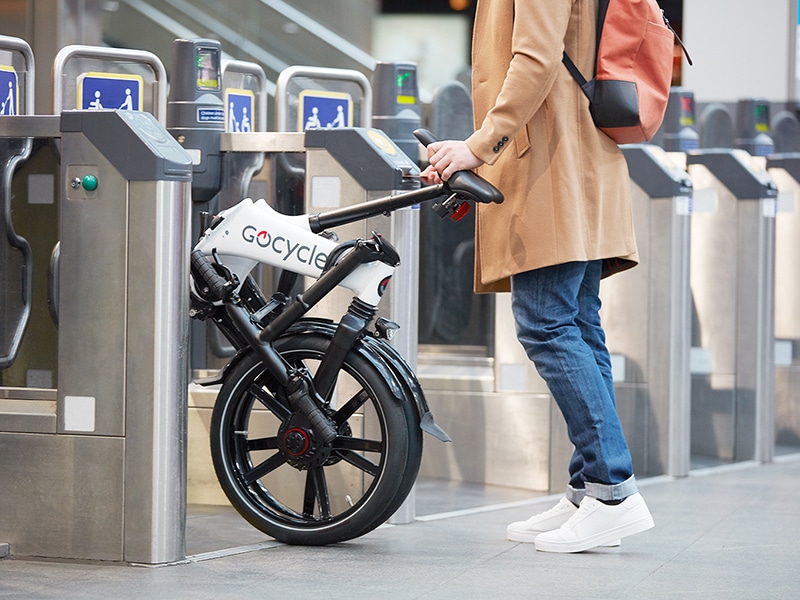
The Gocycle GX can be wheeled along once folded
Active Commuting
It’s in urban areas that e-bikes really come into their own. The e-bike format is possibly the best and most efficient form of urban transport on the planet! They are perfect for riders wanting to get to work without getting hot or sweaty or needing to wear cycling attire. Congestion is gridlocking our cities so much so that a recent INRIX study has found that 70% of short vehicle trips in the UK (0-3 miles) would be faster using micromobility transport options. Electric cars will certainly improve air quality in our urban areas but will not help to tackle congestion or sedentary commuting.
Beyond the benefits of speedy journey times, e-bikes bring incredible versatility and practicality and a low cost of ownership for urban riders. Charging is very cheap, depending on your energy tariff, our fast-folding GX model would cost just 4p for a full charge, providing a range of up to 40 miles. When you start to do the maths around the price of car ownership, parking and public transport users can quickly see how an e-bike would pay for itself over a longer period – not to mention the savings that come from improved personal health and wellbeing.
Folding electric bikes bring the added benefit of ultimate convenience and total anti-theft capability. Users can store them in their place of work, perhaps even by their desk. The total piece of mind that comes from having your two-wheeled EV safely stored in your office of city living space cannot be underestimated. Regrettably theft of bicycles is still a scourge that plagues us all. With fast-folding models, like the G, that worry is completely removed.
Usage not Ownership
Electric bikes lower the barrier to entry for people who want to begin to live a more sustainable lifestyle with them requiring a significantly lower initial outlay than electric cars. Of course, road infrastructure projects to develop more safe cycle ways is fundamental and should continue as a long-term strategy to enable more riders to adopt two-wheeled EVs. But we should also encourage electric bike uptake with incentives similar to that of electric cars. There are many effective schemes out there that incentivise bike purchases, such as the Cycle to work scheme that offers a discount on the purchase price of the e-bike if bought through your employer, but while these schemes do help, they reward ownership and not necessarily usage.
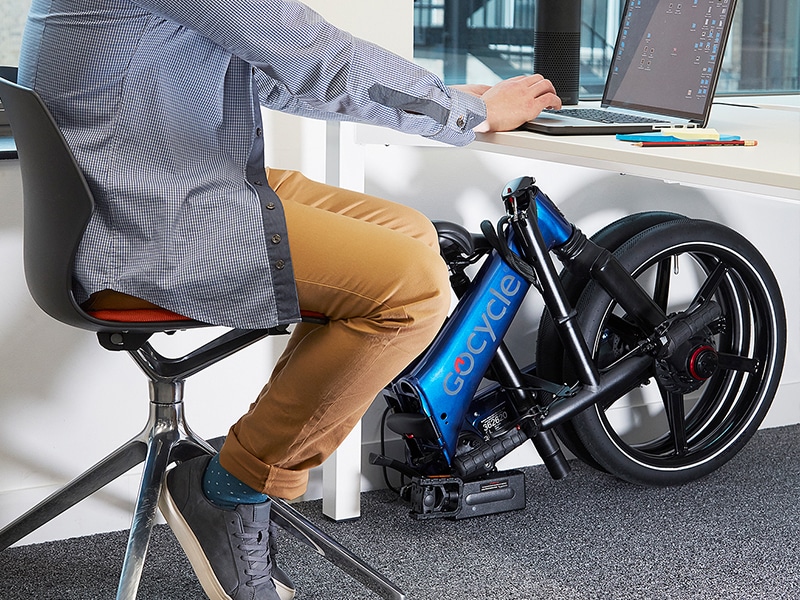
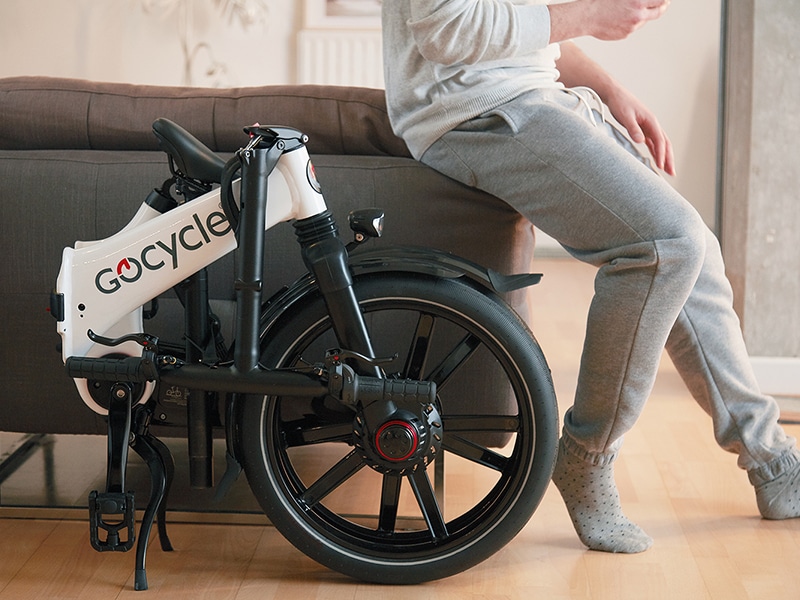
We need to incentivise usage to drive behavioural change and accelerate the benefit impact. At Gocycle, we have introduced a policy that sees the business pay its employees 40p per mile when they commute to work by e-bike rather than using their car. There are countless studies that show that encouraging cycling reduces sickness levels and contributes to a more productive, healthier and happier workforce. Governments should offer employers tax credits for example on all e-bike miles commuted. There is a wide body of research that proposes a net positive to society for each mile cycled vs. other more resource intensive methods.
Electric cars are an important part of the puzzle in making our urban areas more sustainable, but I believe that e-bikes are the vital, missing piece. Green number plates? More cycle lanes please!
See a review of the new Gocycle GX.
About the author
Richard Thorpe is the designer behind urban electric bike brand Gocycle and one of the pioneers in the e-bike industry having founded the business in 2002.





